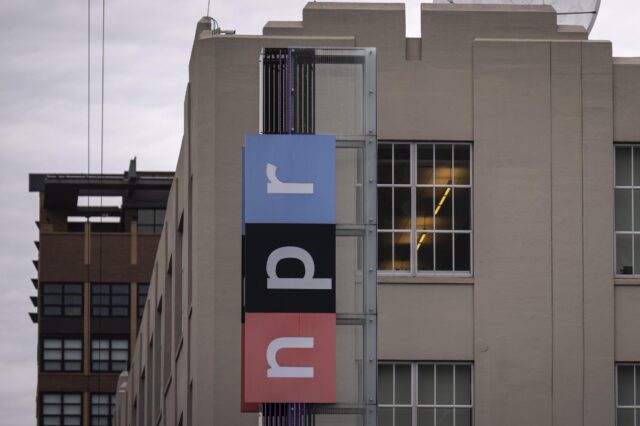
ARSTECHNICA.COM
White House calls NPR and PBS a “grift,” will ask Congress to rescind funding | Markey: Cutting NPR and PBS "is not budget discipline, it's cultural sabotage."
Public broadcasting
White House calls NPR and PBS a “grift,” will ask Congress to rescind funding
Markey: Cutting NPR and PBS "is not budget discipline, it's cultural sabotage."
Jon Brodkin
–
Apr 15, 2025 3:31 pm
|
110
National Public Radio (NPR) headquarters on February 22, 2023 in Washington, DC.
Credit:
Getty Images | Drew Angerer
National Public Radio (NPR) headquarters on February 22, 2023 in Washington, DC.
Credit:
Getty Images | Drew Angerer
Story text
Size
Small
Standard
Large
Width
*
Standard
Wide
Links
Standard
Orange
* Subscribers only
Learn more
The Trump White House is proposing to eliminate most federal funding for National Public Radio (NPR) and the Public Broadcasting Service (PBS) and issued a statement yesterday alleging that NPR and PBS "spread radical, woke propaganda disguised as 'news.'"
"The NPR, PBS grift has ripped us off for too long," the White House statement said.
White House budget director Russ Vought drafted a memo for a rescission plan that would eliminate funding already approved by Congress, according to multiple news reports. This includes $1.1 billion for the Corporation for Public Broadcasting (CPB), or about two years' worth of funding for the nonprofit group that provides money to public broadcasting stations.
The Vought memo accused CPB of a "lengthy history of anti-conservative bias," according to The New York Post. The memo also reportedly proposes an $8.3 billion cut for USAID.
The $1.1 billion accounts for most of the federal money that goes to CPB. "The Trump administration isn't planning to ask Congress to claw back about $100 million allocated for emergency communications," The New York Times wrote. The NYT wrote that CPB "is 'forward-funded' two years to insulate it from political maneuvering, and a sizable chunk of the money for 2025 has already been paid out to public broadcasters in the United States."
In March, Trump said in a Truth Social post that NPR and PBS are "two horrible and completely biased platforms" that "should be DEFUNDED by Congress, IMMEDIATELY."
In a statement provided to Ars today, PBS CEO Paula Kerger said that "the effort underway to get Congress to rescind public media funding would disrupt the essential service PBS and local member stations provide to the American people. There's nothing more American than PBS, and our work is only possible because of the bipartisan support we have always received from Congress... Without PBS member stations, Americans will lose unique local programming and emergency services in times of crisis."
We also contacted the CPB and NPR today and will update this article if they provide any comments.
Markey: “Outrageous and reckless... cultural sabotage”
Sen. Ed Markey (D-Mass.) blasted the Trump plan, calling it "an outrageous and reckless attack on one of our most trusted civic institutions... From 'PBS NewsHour' to 'Sesame Street,' public television has set the gold standard for programming that empowers viewers, particularly young minds. Cutting off this lifeline is not budget discipline, it's cultural sabotage."
Citing an anonymous source, Bloomberg reported that the White House "plans to send the package to Congress when lawmakers return from their Easter recess on April 28... That would start a 45-day period during which the administration can legally withhold the funding. If Congress votes down the plan or does nothing, the administration must release the money back to the intended recipients."
The rarely used rescission maneuver can be approved by the Senate with a simple majority, as it is not subject to a filibuster. "Presidents have used the rescission procedure just twice since 1979—most recently for a $15 billion spending cut package by Trump in 2018. That effort failed in the Senate," Bloomberg wrote.
CPB expenses in fiscal-year 2025 are $545 million, of which 66.9 percent goes to TV programming. Another 22.3 percent goes to radio programming, while the rest is for administration and support.
NPR and PBS have additional sources of funding. Corporate sponsorships are the top contributor to NPR, accounting for 36 percent of revenue between 2020 and 2024. NPR gets another 30 percent of its funding in fees from member stations. Federal funding indirectly contributes to that category because the CPB provides annual grants to public radio stations that pay NPR for programming.
PBS reported that its total expenses were $689 million in fiscal-year 2024 and that it had $348.5 million in net assets at the end of the year.
NPR and PBS are also facing pressure from Federal Communications Commission Chairman Brendan Carr, who opened an investigation in January and called on Congress to defund the organizations. Carr alleged that NPR and PBS violated a federal law prohibiting noncommercial educational broadcast stations from running commercial advertisements. NPR and PBS both said their underwriting spots comply with the law.
Jon Brodkin
Senior IT Reporter
Jon Brodkin
Senior IT Reporter
Jon is a Senior IT Reporter for Ars Technica. He covers the telecom industry, Federal Communications Commission rulemakings, broadband consumer affairs, court cases, and government regulation of the tech industry.
110 Comments
0 Commenti
0 condivisioni
46 Views


